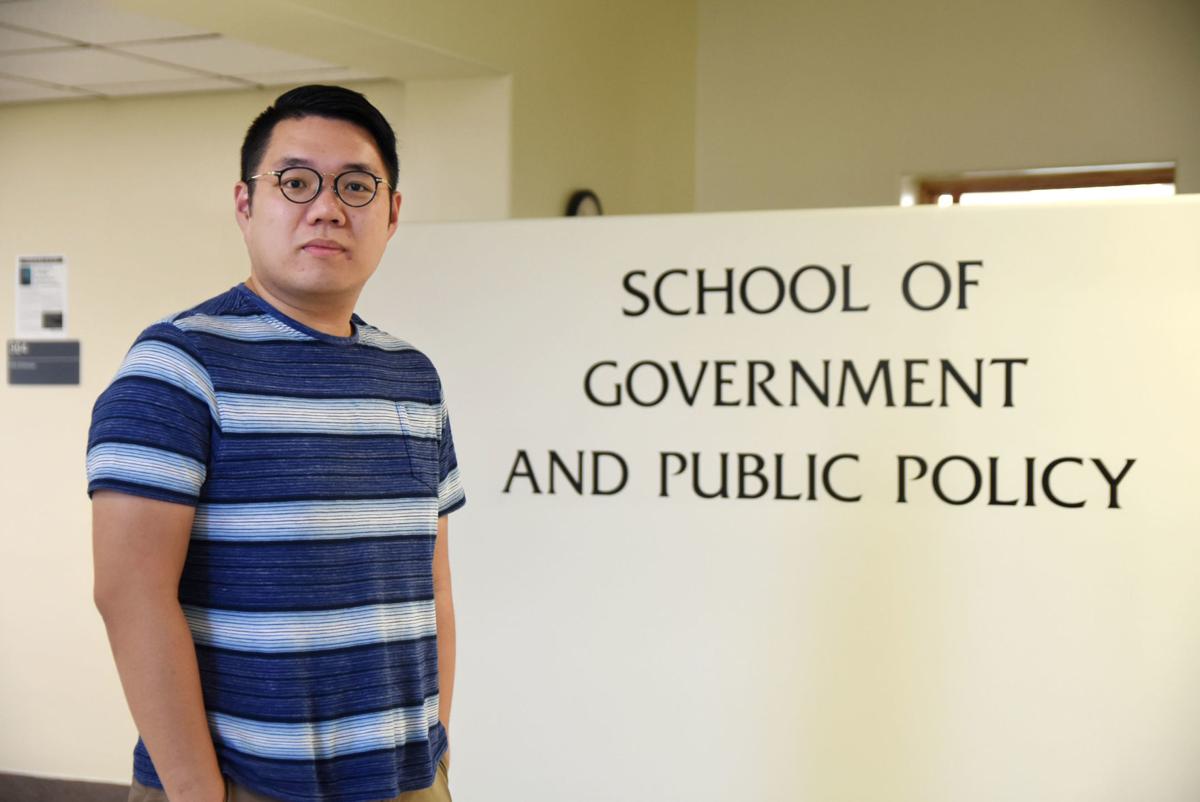Sanho Chung never thought the first tear-gas grenade would explode, but it did.
He heard the blast while distributing surgical masks, bottles of water, umbrellas and first-aid supplies to protesters in Hong Kong during the 2014 Umbrella Movement, where people demanded to elect their own leader without China’s interference.
He then smelled tear gas. He cursed in his native Cantonese. He knew something bad just happened. He started to run.
Smelling tear gas was “just like you put a bunch of wasabi in your nostrils. The wasabi went down from your nasal passage to your trachea, and you have to cough it out,” Chung said.
“Now … of course, it’s nothing,” he said. “(I’m) getting used to the smell of tear-gas grenades.”
Chung, who identifies himself as a Hong Konger and a participant in social movements in Hong Kong since 2013, started his first semester this fall at the University of Arizona as a doctoral student in the School of Government and Public Policy, at a time of escalating protests in Hong Kong. The UA says 23 students from Hong Kong are enrolled at the university this semester.
Although Chung’s career goal is to become an assistant professor in the United States or elsewhere, he still cares about public affairs in his homeland.
Chung, 26, was born in Hong Kong four years before the United Kingdom ended its colonization and transferred the sovereignty of Hong Kong to China. He didn’t realize the influence of British governance on his hometown until he grew up, Chung said.
His parents were from Fujian, a southern province. He became a fan of Chinese history after his cousin introduced him to “Records of the Three Kingdoms.” When he was in high school, Chung expected to become a high school history teacher himself.
However, he changed his career goal to a university professor after he studied government and international Studies at Hong Kong Baptist University.
“When I got into the Baptist (University) in GIS, government and international studies, I realized, ‘Oh, I love political science and I’m interested in doing research as well,’” Chung said.
Studying political science has changed his life.
“Actually, I called myself politically apathetic in the past,” he said. He just wanted to research history. However, he later realized that history and politics are closely bound.
Chung thought deeper when he learned from John Locke, Thomas Hobbes, and Max Weber’s concept of sovereignty.
“Put these things into China-Hong Kong relations,” he said. “Hong Kong-China relations, you would realize that one country, two systems is not going to work.”
He first participated in politics on June 4, 2013. Chung went to Hong Kong Victoria Park where people were mourning the 1989 victims of Tiananmen Square through a candlelight vigil. The protesters cried out, “We Chinese must fight for democracy!”
“You would feel like you were participating in a cult,” Chung said.
According to Chung, people who held the vigil believed that only when China turns to democracy can Hong Kong have democracy, and that Hong Kong can be a model of democracy to affect the whole of mainland China.
He became a supporter of democracy in Hong Kong and his identity as a Hong Konger, instead of a Chinese. That was what triggered him to go on the street again and again.
“In fact, the Umbrella Movement to me is not a paradigm shift, because I realized that the identity of being a Chinese and that of a Hong Konger became incompatible a long time ago,” Chung said.
Regarding his role in social movements, Chung considers himself as a participant, rather than an activist.
“I think this label (activist) is a little bit strange,” Chung said. “I don’t engage in politics for a living, nor do I join any political parties, or have launched social movements, but I truly put more attention on current political and social situation than normal people.”
“I would also interact with activists, but I’m not being more active, or as active as they are,” he said.
Adam Douglas Henry, an associate professor in the UA School of Government and Public Policy, said he first met Chung in a workshop in 2018 in Singapore. He encouraged Chung to apply for the UA Ph.D. program.
Henry remains neutral when asked about Chung’s participation in social movements.
“I’m aware that he’s a participant of social movements,” Henry said. “I’m aware that these movements are important. But I’m not really involved.”
Chung said it’s hard to get people in Tucson to care about Hong Kong issues. “Maybe use NBA as an example. You know? Morey, that case. Blizzard Entertainment, Hearthstone … These can work.”
General manager Daryl Morey of the NBA’s Houston Rockets tweeted and quickly deleted an image that showed support for Hong Kong protesters on Oct. 5, offending Chinese people and eventually causing China’s state broadcaster to suspend a plan to broadcast the NBA’s preseason games in China.
Ng Wai Chung, a Hearthstone player from Hong Kong, also known as Blitzchung, was punished by Blizzard Entertainment after he repeated pro-democracy protesters’ slogan “Liberate Hong Kong, the revolution of our times” in Mandarin in an interview in October.
“When China’s interference didn’t only happen in Hong Kong, but also reached to Americans’ daily life, American people might start to follow (the news), because Hong Kong and America have a common issue: China’s interference,” Chung said.
This fall, Chung and a group of graduate students from Hong Kong established the Hong Kong Democratic Alliance of Overseas Postgraduate Students. The organization aims to promote Hong Kong studies in academic fields in other countries.
“I don’t have a very single concept that I want to share with people,” Chung said. “What I did is based on my belief. Whenever what is good for Hong Kong, I would just say it.”





